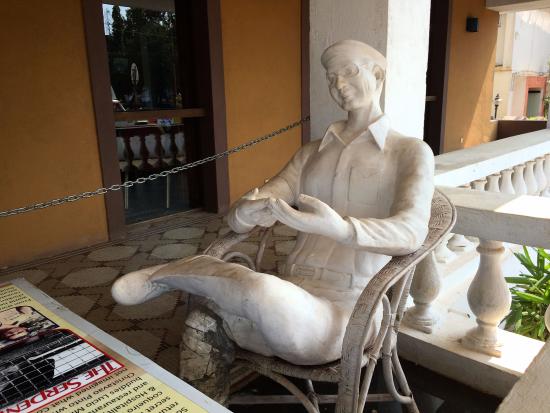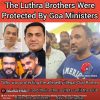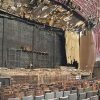Goa is abuzz with excitement as vintage bike and car owners, users, collectors and fans are decking […]

GOA SANCTUARY OF CRIMINALS
June 10-June 16 2017, Stray Thoughts June 10, 2017SEAMY UNDERSIDE: Under the glitz and glamour, Goa has been a haven for criminals, right from the infamous bikini killer Charles Sobhraj, to modern day dons who have friends in high places within Goa’s political landscape. Sobhraj has been romanticised with a statue at O’Coqueiro, where he was captured by the Maharastrian police
By Rajan Narayan
AND a few stray thoughts for yet another Saturday. For a Saturday following the week when the Additional Collector Sabaji Shetye was arrested for accepting a bribe of `25,000 in his office for granting a license for storing explosives. For a Saturday following the week when the Middle East countries including Saudi Arabia and the UAE decided to boycott Qatar. For a Saturday following the week when we realised why the IT Industry has stayed away from Goa. For a Saturday following the week when Manohar Parrikar, the chief minister, sought to blame the Congress for the shortage of beef in Goa.
RED-HANDED
AND a few stray thoughts for yet another Saturday. For a Saturday following the week when one of the senior most officers of the Goa Civil Service Sabaji Shetye, an additional collector with the rank of additional judicial magistrate was caught red handed taking a bribe of `25,000 from an agent for providing a license for storing explosives. Apparently Shetye’s original demand was `1.5 lakhs which the agent managed to negotiate and bring down to `95,000 to be paid in three instalments. The agent Nishant Kurade logged a complaint with the Anti-Corruption Branch of the police headed by Bosco George who set a trap and caught Shetye red-handed.
The officials providing licenses for purchase and storage of explosives are expected to be very honest and very careful. This is because explosives can be used for terrorist activities. All it requires to blow up the two Mandovi bridges is dynamite sticks which are used by the mining industry extensively in Goa. Goa has always been a haven for explosives as, besides mining, the construction boom has also increased the demand for explosives. The Kadamba plateau which is the new hub for construction activity is very rocky. Builders have to use dynamite to break up the rocks and stones before they put up the foundation of the building. In Goa explosives are used illegally even for fishing. There have been complaints that trawler owners use explosives under water to drive fish into their nets.
With terrorist activities both in the country and around the world registering a sharp increase, the Goa government should have been extra careful in granting licenses for explosives. It is equally important to exercise caution in approving of places for storage of explosives. For instance if explosives are stored in residential areas they can be triggered by the explosion of a gas cylinder. There are conditions in place for the storage of explosives. The fact that a senior officer of the Goa government was willing to give permission for storage of explosive for as little as `25,000 shows how little concern the Goa government has for the lives of the people.
The historical belief is that terrorists do not and will not target Goa, as they think of it as a holiday destination. It is also easy for terrorists to hide among the tourists in Goa, particularly because the rule that hotels and even those who rent houses should register their guests with the police, is never followed.
The earliest case of a notorious criminal hiding in Goa was that of Charles Sobhraj, who was known as the ‘bikini killer’ for robbing and killing dozens of women all over the world. After his escape from Tihar Jail in Delhi, he spent almost a month in Goa, with the Goa police having no clue that he was having a holiday in the state. He was caught not by the Goa police, but by the Maharashtrian police, when he came to make an STD call at the O’Coqueiro hotel in Porvorim. Those were the bad old days, long before mobiles, when even making an STD call from Goa to Bombay, forget London, used to take almost eight hours. The O’Coqueiro bar-in-charge had bribed the BSNL Authorities to put through his STD calls very fast. Which is why Charles went there and got caught in a dramatic fashion by Inspector Zende of the Mumbai police. The Mumbai police had so little faith in the Goa police that they were not informed and came to know only after the police party had crossed the border.
Just before the Mumbai terror blasts took place, in which landmarks like the Stock Exchange and the Centaur hotel were targeted, one of the main accused was shopping for property in Goa. Yakub Memon, who was the CA of Dawood Ibrahim, was the guest of the then Calangute MLA Suresh Parulekar who was a minister in the Congress government. We do not know whether he is related to Dilip Parulekar, former MLA of Siolim, who got defeated in the 2017 election. Yaseen Bhatkal, among the most dreaded terrorists, also stayed in Vasco and Chimbel for several months without the knowledge of the Goa police. Under the circumstances the act of a high official taking the bribe for storing explosives is a threat to the security of the country which the former Raksha Mantri should be concerned about.
QATAR BOYCOTT
AND a few stray thoughts on the Middle East countries like Saudi Arabia and the UAE boycotting Qatar which supplies over 90 per cent of the LPG needs of India. Do not be surprised if there is a sudden shortage of gas cylinders. If you have not booked your next cylinder do so now. The reason why Saudi Arabia, the UAE, Bahrain, and even Egypt, are boycotting Qatar is because it is suspected to be helping the Islamic state terrorists. The suspicion has strengthened after Scotland Yard has established a link between Qatar and the recent carnage on London Bridge. The London Bridge incident was followed by a similar stabbing incident in front of a famous church in France the day after. Unlike Goa, the Middle East countries are very cautious about terrorism as they are the largest petroleum producers, and a terrorist strike against the oil wells could paralyse their economy.
Qatar is among the biggest oil producing countries in the Middle East. It is also the biggest producer of natural gas and accounts for over 90 per cent of the imports of LPG by India. Contrary to the general impression, Mukesh Ambani and company supply less than 5 per cent of the gas requirement of the domestic sector. The boycott of Qatar by the Middle East countries has badly affected the over five lakh Indians and 50,000 Goans who are working there.
The immediate results is that many Goans who had booked to come to Goa for a holiday during Ramzan which is holiday time in Qatar have not been able to do so due to cancellation of flights. This is because Saudi Arabia and the other Gulf countries have banned Qatar aircraft from flying over their countries. This means that a Qatar airline has to take a detour which could take four to six hours. Goans are particularly affected as Qatar airlines had a direct flight from Goa to Doha which is the capital of Qatar.
According to Sushma Swaraj, the external affairs minister, there is no immediate threat to Indians and Goans in Qatar. But if the boycott continues, many Indians and Goans will lose their jobs as Qatar is dependent on Saudi Arabia and the other Gulf countries for most of the supplies of food and daily necessities. The Middle East boycott shows a toughening in the stand against terrorism by the Islamic countries. In the past Saudi Arabia was considered one of the main sponsors of terrorism and was the country which created Osama Bin Laden.
Muslims in India may find it difficult to get visas and jobs in the Middle East, where they were given preference earlier, because of their increasing links with the Islamic State. For the benefit of those who are not aware, the Islamic State is a rebel group which has set up a parallel government in Syria on the border of Iraq where the Sharia laws are implemented in their extreme form. Women are not allowed to study and have to cover themselves completely and even men have to very strictly follow conservative Islam dictats.
GOA WITHOUT IT
AND a few stray thoughts on why Information Technology majors like Infosys, TCSs and Wipro have stayed away from Goa. It must be admitted that Goa has not shown enough interest in getting the big companies which employ lakhs of engineers to set up centres in Goa. I recall that in 2003, when IFFI was held for the first time, Parrikar was more interested in IFFI then in having dinner with top IT entrepreneurs at the IT summit at the Marriott. When other states like Andhra Pradesh and Karnataka were spreading out the red carpet and offering free land and other incentives, Parrikar is reported to have kept Azim Premji waiting for two days for an appointment. But the main reason why IT will not work in Goa is because of poor connectivity. Forget about running an IT company and call centres, you cannot even run newspapers in Goa. Because even in the media now you cannot work without uninterrupted connectivity and high-speed downloads.
Unlike in the good old days, the printing press of a newspaper is not attached to the editorial offices. Except in the case of the Navhind Times, the printing presses of all the other newspapers are more than 25 km away from their editorial offices. When the pages are ready they are sent by email to the printing press where they are converted into plates to be mounted on the printing machines which can produced more than a lakh ready-made folded newspapers of even a hundred pages in an hour.
Moreover news does not come on the old tele-printer but through email to computers. Nobody uses snail-mail for sending articles or letters or even artwork for advertisements, which are the life blood of every media. Everything is done online.
BSNL is certainly the most reliable of the broadband service providers in Goa and the country. Their senior officers are very committed. Their problem is that most of their foot soldiers, the linesmen who maintain the broadband services, have been trained in the old technology and are not familiar with even smart phones, let alone computers, and being a government organisation they cannot be sacked. The only way an IT Company can function in Goa is if they get a dedicated fibre optic connection from not BSNL but VSNL which is the international counter part of BSNL. Though I understand that BSNL also provides dedicated fibre optic cables now.
The fact remains that the functioning of the Internet broadband is very erratic and is a nightmare for professionals. This is with all due respect to the dedication of the senior officers in charge of BSNL in Panjim like Mr D’souza and Mr Costa who are truly dedicated to customer service and most helpful.
In any case in Goa we have no choice except to continue to depend on BSNL. Many private internet service providers have set up shop like Hatchway and G-Wave. During the last week when our broadband connections were being very uncooperative I was tempted to try out G-Wave. This was partly because every house and every office close to my own office had a G-Wave board suggesting that they were providing internet services. I decided to call up the mobile number given in the advertisement. I discovered that I was talking to a call centre which kept telling me to press this number or that for various services. Since I don’t like call centres I called up the landline number. The phone was picked up by a girl who seemed to have joined only the previous day and did not know anything about the kind of services offered by the company. She wanted to know what broadband was.
However, she gave me the mobile number of the manager called Mansoor Ali. When I called him he told me he was driving and would call me after half an hour. When I did not hear from him even after two hours I called him again. Only to get a message that he was in Mobor, 80 km away in South Goa, at a conference. The next day when I called him he did not pick up the phone, his excuse this time being he was in the washroom. If this is the attitude of private internet providers to a business enquiry can imagine how bad their post-sales service network will be. I personally have decided not to go to G-Wave but to hold on the old faithful BSNL.
BEEF BLAME GAME
AND a last stray thought for yet another Saturday. During the month of Ramzan when beef is part of the Iftar (breaking of the fast) there was no beef in Goa because the RSS bhakts had stopped the trucks bringing cattle from Karnataka to Goa for slaughter. Parrikar is passing the buck for the beef-deficit to Goa Pradesh Congress Committee (GPCC) chief Luizinho Faleiro on the grounds that Karnataka has a Congress government. Goa may have any number of stray ‘holy’ cows and fighting bulls but it’s entirely dependent on Karnataka for its supply of beef. And contrary to the claims of the Gau Rakshaks the sale of buffalos and bullocks or their consumption has not being banned by the centre.
Animal husbandry which is the science of looking after animals is a state subject under the Constitution. So much so the Central government has no rights to pass any law relating to the transport, slaughter and consumption of beef even if it is the flesh of the ‘holy’ cow. But 99.99 per cent of Indians including Catholics and Muslims eat buffalo meat or the meat of cows which are too old to yield milk and have outlived their productivity. The only states which have banned the slaughter, storage and consumption of beef, are BJP states.
Indeed a retiring judge of the Rajasthan High Court, which is ruled by the BJP, demanded life imprisonment for anybody who kills a cow. The Hindutva judge who fortunately is retired also claimed that peahens become pregnant not by having sex but by drinking the tears of peacocks!
Goa is a BJP State. But it is a BJP state which depends on a minority community for its existence. What is surprising is not the silence of Parrikar on the Central ban on movement of cattle but the failure of the seven Catholic BJP MLAs to protest. It would appear all our Catholic MLAs have become Hindu Catholics like the former Deputy Chief Minister Francis D’Souza.















